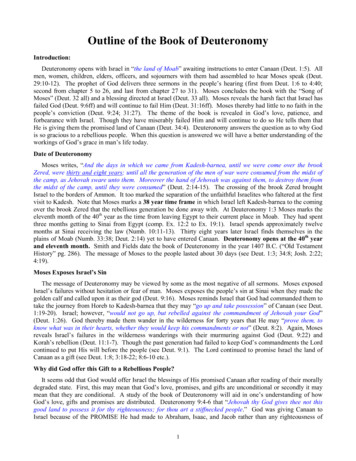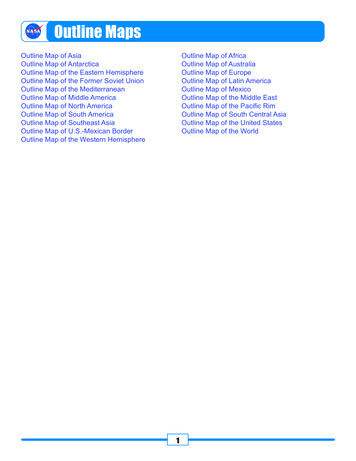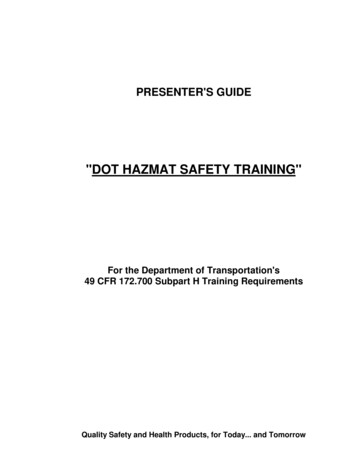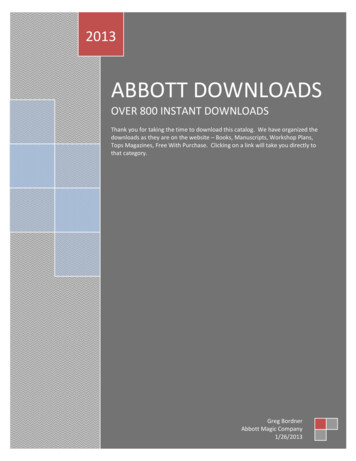
Transcription
Outline of the Book of DeuteronomyIntroduction:Deuteronomy opens with Israel in “the land of Moab” awaiting instructions to enter Canaan (Deut. 1:5). Allmen, women, children, elders, officers, and sojourners with them had assembled to hear Moses speak (Deut.29:10-12). The prophet of God delivers three sermons in the people’s hearing (first from Deut. 1:6 to 4:40;second from chapter 5 to 26, and last from chapter 27 to 31). Moses concludes the book with the “Song ofMoses” (Deut. 32 all) and a blessing directed at Israel (Deut. 33 all). Moses reveals the harsh fact that Israel hasfailed God (Deut. 9:6ff) and will continue to fail Him (Deut. 31:16ff). Moses thereby had little to no faith in thepeople’s conviction (Deut. 9:24; 31:27). The theme of the book is revealed in God’s love, patience, andforbearance with Israel. Though they have miserably failed Him and will continue to do so He tells them thatHe is giving them the promised land of Canaan (Deut. 34:4). Deuteronomy answers the question as to why Godis so gracious to a rebellious people. When this question is answered we will have a better understanding of theworkings of God’s grace in man’s life today.Date of DeuteronomyMoses writes, “And the days in which we came from Kadesh-barnea, until we were come over the brookZered, were thirty and eight years; until all the generation of the men of war were consumed from the midst ofthe camp, as Jehovah sware unto them. Moreover the hand of Jehovah was against them, to destroy them fromthe midst of the camp, until they were consumed” (Deut. 2:14-15). The crossing of the brook Zered broughtIsrael to the borders of Ammon. It too marked the separation of the unfaithful Israelites who faltered at the firstvisit to Kadesh. Note that Moses marks a 38 year time frame in which Israel left Kadesh-barnea to the comingover the brook Zered that the rebellious generation be done away with. At Deuteronomy 1:3 Moses marks theeleventh month of the 40th year as the time from leaving Egypt to their current place in Moab. They had spentthree months getting to Sinai from Egypt (comp. Ex. 12:2 to Ex. 19:1). Israel spends approximately twelvemonths at Sinai receiving the law (Numb. 10:11-13). Thirty eight years later Israel finds themselves in theplains of Moab (Numb. 33:38; Deut. 2:14) yet to have entered Canaan. Deuteronomy opens at the 40th yearand eleventh month. Smith and Fields date the book of Deuteronomy in the year 1407 B.C. (“Old TestamentHistory” pg. 286). The message of Moses to the people lasted about 30 days (see Deut. 1:3; 34:8; Josh. 2:22;4:19).Moses Exposes Israel’s SinThe message of Deuteronomy may be viewed by some as the most negative of all sermons. Moses exposedIsrael’s failures without hesitation or fear of man. Moses exposes the people’s sin at Sinai when they made thegolden calf and called upon it as their god (Deut. 9:16). Moses reminds Israel that God had commanded them totake the journey from Horeb to Kadesh-barnea that they may “go up and take possession” of Canaan (see Deut.1:19-20). Israel; however, “would not go up, but rebelled against the commandment of Jehovah your God”(Deut. 1:26). God thereby made them wander in the wilderness for forty years that He may “prove them, toknow what was in their hearts, whether they would keep his commandments or not” (Deut. 8:2). Again, Mosesreveals Israel’s failures in the wilderness wanderings with their murmuring against God (Deut. 9:22) andKorah’s rebellion (Deut. 11:1-7). Though the past generation had failed to keep God’s commandments the Lordcontinued to put His will before the people (see Deut. 9:1). The Lord continued to promise Israel the land ofCanaan as a gift (see Deut. 1:8; 3:18-22; 8:6-10 etc.).Why did God offer this Gift to a Rebellious People?It seems odd that God would offer Israel the blessings of His promised Canaan after reading of their morallydegraded state. First, this may mean that God’s love, promises, and gifts are unconditional or secondly it maymean that they are conditional. A study of the book of Deuteronomy will aid in one’s understanding of howGod’s love, gifts and promises are distributed. Deuteronomy 9:4-6 that “Jehovah thy God gives thee not thisgood land to possess it for thy righteousness; for thou art a stiffnecked people.” God was giving Canaan toIsrael because of the PROMISE He had made to Abraham, Isaac, and Jacob rather than any righteousness of1
their own (see Deut. 1:8; 6:10; 9:5; 29:15; 30:20; 34:4). The New Testament teaches the same principle. TheApostle Paul wrote, “For by grace have ye been saved through faith and that not of yourselves, it is the gift ofGod; not of works, that no man should glory” (Eph. 2:8-9). God offers His gifts to man by promise because Heloves us rather than it being due to our righteous ways. We are all sinful men and truly deserve the wages of sin(Rom. 3:23; 6:23). A grave mistake; however, is made by the “religious” world when they conclude that man isa sinner, God loves, therefore let us continue in sin. The apostle Paul said, “Shall we continue in sin, that gracemay abound? God forbid. We who died to sin, how shall we any longer live therein?” (Rom. 6:1-2). Jamessaid, “faith, if it have not works, is dead in itself” (James 2:17). To reconcile the confusion on the part of ourdenominational friends we may sum this subject up in the following way. When one loves God they will do allwithin their power to keep his commandments (Jn. 14:15). When one claims to “believe” in Jesus (Jn. 8:24)they will prove this faith by keeping God’s commandments (Jn. 3:36; Heb. 11:1ff). When one says that they“fear” God they will evidence this fear in their obedience (see Deut. 5:29; 6:2; Rev. 14:17 comp. to John 15:510). Man’s eternal abode is dependant upon whether he or she loved, feared, and believed in God. The authorof Hebrews makes the lesson of God’s conditional salvation clear by connecting the events of Exodus throughDeuteronomy with man’s obligation to obey God today. Yes, our salvation is conditioned upon our obedience.The book of Deuteronomy sets firm within our minds the conditional will of God for man to be obedient inorder to receive His gifts. Israel was told to “contend in battle” to receive God’s gifts at Deuteronomy 2:24.Israel was told to “keep the commandments of Jehovah thy God” in order to receive “the good land which Godhath given thee” (Deut. 8:6-10 see also Deut. 6:4; 10:20; 19:9; 26:16-19; 30:2, 6, 10, 16, 20). Moses speaksclearly saying that “God requires” man to fear, love, serve, and keep all His commandments (Deut. 10:12-13).This obedience was a requirement for Israel to obtain God’s gift of Canaan (see Deut. 4:1-2; 11:22-23; 27:9-10).Those who do not keep all God’s commandments are cursed (Deut. 27:26; 28:15-58ff) and those who keepGod’s word are blessed (Deut. 28:1-2). The promises, thereby, that God gave to Abraham would only berealized and received by those who had the faith of Abraham (see Gen. 15:6; 18:19; 22:18; Rom. 4:1ff).The Importance of Maintaining the Purity of God’s PeopleThe Lord God Almighty said, “Thou shalt be perfect with Jehovah thy God” (Deut. 18:13). Seeing thatGod’s gifts are conditioned upon man’s obedience Moses warned Israel on a multitude of occasions to “putaway the evil from the midst of thee” (Deut. 21:9, 21; 22:21, 24). Moses fixes firmly in the minds of theIsraelites that they are to utterly detest and abhor unlawful things that are an abomination to God (Deut. 7:26).False prophets who sought to draw the hearts of the people away from God were not to be listened to, spared,pitied, or concealed but rather killed (Deut. 13:1-9). Israel was about to enter into a land that was filled withabominable acts including idolatry (see Deut. 9:5). Due to Canaan’s idolatry and wickedness God commandedsome of the most brutal language in the Bible (see Deut. 20:16-18). The possibility of Israel being infected withsinful teaching and practices was real (Deut. 20:18). Blessings and curses were at stake!What Can We Learn from Deuteronomy Today?We learn that we, like Israel of old, are sinful people (see Deut. 9:6, 24; Rom. 3:23; I Jn. 1:8). We also learnthat God continues to demand that we be perfect (Deut. 18:13; Matt. 5:48) and holy (I Pet. 1:15-16) just as Heis. The Lord has continued His promise that was originally offered to Abraham, Isaac, and Jacob (see Gen.12:1ff) and realized in Jesus Christ (see Gal. 3:8, 16). That promise is the gift of salvation (see Acts 13:32, 3738; Gal. 3:14; Eph. 2:8) and discovered in the forgiveness of sins (see Acts 2:38). Nothing has changed todaywith God (see Heb. 13:8). The Lord continues to express the conditional nature of His salvation and theforgiveness of sins (see Acts 22:16; Eph. 1:7; Heb. 3:12 – 4:11). Moses wrote, “And now, Israel, what dothJehovah thy God require of thee, but to fear Jehovah thy God, to walk in all his ways, and to love him, and toserve Jehovah thy God with all thy heart and with all thy soul, to keep the commandments of Jehovah” (Deut.10:12-13). Jesus revealed this as the great commandment for all humanity to give heed to (Matt. 22:37).The Book of Deuteronomy teaches us that God is merciful, loving, patient, forbearing, and longsufferingwith all sinful men (Deut. 34:4; II Pet. 3:9). God; however, is not ever suffering with sinners (Rev. 2:20). Hislove, gifts, and promises belong to those who illustrate their love, faith, and fear in Him. Those who reject hismercy and patience through disobedience will be judged and cast into the lake of fire (Rev. 20:10-15; 21:8).Those who are obedient to God, through a spirit of conviction, shall receive an eternal heavenly home (Rev.21:1-7).2
Outline of DeuteronomyChapter OneI.Geographic location of Moses’ Three Sermons (1:1-5):A. “These are the words which Moses spake unto all Israel beyond the Jordan in the wilderness, in theArabah over against Suph, between Paran, and Tophel, and Laban, and Hazeroth, and Di-zahab”(1:1).1. Moses records, “These are the words.” to indicate what is about to be said in relation to whathas already been said.2. The geographic location of these three sermons is given here and again at Deuteronomy 4:46.Moses refers to the wilderness of Arabah as “the valley over against Beth-peor” at 4:46. The“Arabah” “The term was applied specifically in part or wholly to the depression of the JordanValley, extending from Mt. Hermon, a 9100 ft elevation in the Anti-Lebanon Range, due Sbeyond the Sea of Chinnereth (Galilee), and including both sides of the river Jordan, the DeadSea, and the region slightly to the southwest asfar as the head of the Gulf of Aqabah” (ISBE v.1, pp. 218). The location of many of the listedplaces is in question. One thing that is known isthat Moses is in “the land of Moab” (Deut. 1:5).Consider the following:a. Suph: “Some scholars have followed theLXX, Targum, Vulgate, and AV inunderstanding Suph as a shortened form ofHeb. yam suph, which when used inconnection with the Arabah (e.g., Numb.21:4) designates the Gulf of Aqabah” (ISBEv. 4, 665).b. Paran: A general term that includes thewilderness area of Sinai and reaching up toKadesh-barnea.c. Tophel: Unknownd. Laban: Unknowne. Hazeroth: “It was there that Miriam andAaron spoke against Moses’ marriage to theCushite woman and against his position asthe sole mediator between God and Israel(Numb. 12:1ff). The probable location is 30miles NE of Jebel Musa (Mt. Sinai?), on the way to Aqabah” (ISBE v. 2, pp. 636).f. Dizahab: “The location is unknown. Dizahab might possibly be identifried with EdhDheibeh E of Heshbon; but this again is an indifferent campsite” (ISBE v. 1, pp. 979).g. Consider the map to the right:B. “It is eleven days' journey from Horeb by the way of mount Seir unto Kadesh-barnea” (1:2).1. What do you suppose went through people’s minds when they read this statement? Oddly, ittakes only eleven days to reach Kadesh-barnea from Seir (Sinai). The reason I say, ‘Oddly,’ isbecause it took Israel 40 years to reach Kadesh due to their sin of not entering Canaan. Mosessaid to Israel, in relation to their not taking Canaan as God commanded, “Ye have sinnedagainst Jehovah; and be sure your sin will find you out” (Numb. 32:23).2. It seems that the purpose of reminding Israel of the eleven day journey as oppose to the fortyyears it took them to get there was that they were to be reminded of their failures to keep God’slaws. Throughout much of Deuteronomy Moses reminds the people of their failures that theywould better appreciate the blessings of obedience.3. Deuteronomy sets out to illustrate the importance of knowing and keeping God’s laws.3
II.C. “And it came to pass in the fortieth year, in the eleventh month, on the first day of the month, thatMoses spake unto the children of Israel, according unto all that Jehovah had given him incommandment unto them; after he had smitten Sihon the king of the Amorites, who dwelt inHeshbon, and Og the king of Bashan, who dwelt in Ashtaroth, at Edrei. Beyond the Jordan, in theland of Moab, began Moses to declare this law, saying,” (1:3-5).1. The eleventh month of the 40th year represented the time from leaving Egypt to their currentplace in Moab. They had spent three months getting to Sinai from Egypt (comp. Ex. 12:2 to Ex.19:1). Israel spends approximately twelve months at Sinai receiving the law (Numb. 10:11-13).Thirty eight years later Israel finds themselves in the plains of Moab (Numb. 33:38; Deut. 2:14)yet to have entered Canaan. Deuteronomy opens then at the 40th year and eleventh month.2. Moses begins the first of three sermons after having defeated the Amorites and those of Bashan.Before Moses dies and the children of Israel enter Canaan the man of God has some final wordsfor the people.Moses Delivers the First of three sermons: A Call to Remember their Failures (1:6-46):A. “Jehovah our God spake unto us in Horeb, saying, Ye have dwelt long enough in this mountain:turn you, and take your journey, and go to the hill-country of the Amorites, and unto all the placesnigh thereunto, in the Arabah, in the hill-country, and in the lowland, and in the South, and by thesea-shore, the land of the Canaanites, and Lebanon, as far as the great river, the river Euphrates.Behold, I have set the land before you: go in and possess the land which Jehovah sware unto yourfathers, to Abraham, to Isaac, and to Jacob, to give unto them and to their seed after them” (1:6-8).1. The “long enough” time at Sinai was a twelve month period of time in which Israel received thelaw of God (see notes above). Moses reminds the people of the day that they are told to leaveSinai for the promised land of Canaan.2. Canaan was the land promised to Abraham as God’s gift that Israel may grow into a mightynation (cf. Gen. 12:1ff).3. Though God had “given” the land to Israel they would have to go in and “possess” it. The landalready had inhabitants (i.e., the Canaanites). God’s land gift was conditioned upon the peoplegoing in and “possessing” it. The “possessing” of Canaan is where Israel found their trouble.It would have been nice to simply walk in to Canaan without any resistance. Israel; however,was to learn to trust in God and His protection.B. “And I spake unto you at that time, saying, I am not able to bear you myself alone: Jehovah yourGod hath multiplied you, and, behold, ye are this day as the stars of heaven for multitude. Jehovah,the God of your fathers, make you a thousand times as many as ye are, and bless you, as he hathpromised you! How can I myself alone bear your cumbrance, and your burden, and your strife?Take you wise men, and understanding, and known, according to your tribes, and I will make themheads over you. And ye answered me, and said, The thing which thou hast spoken is good for us todo. So I took the heads of your tribes, wise men, and known, and made them heads over you,captains of thousands, and captains of hundreds, and captains of fifties, and captains of tens, andofficers, according to your tribes. And I charged your judges at that time, saying, Hear the causesbetween your brethren, and judge righteously between a man and his brother, and the sojournerthat is with him. Ye shall not respect persons in judgment; ye shall hear the small and the greatalike; ye shall not be afraid of the face of man; for the judgment is God's: and the cause that is toohard for you ye shall bring unto me, and I will hear it. And I commanded you at that time all thethings which ye should do” (1:9-18).1. Exodus 18:13ff reveals the historical event of Moses sitting from morning till evening judgingthe people. Moses’ father-in-law saw the thing and said, “The thing that thou doest is not good.Thou wilt surely wear away, both thou, and this people that is with thee: for the thing is tooheavy for thee; thou art not able to perform it thyself alone” (Ex. 18:17-18). At times advicesuch as this should be rejected; i.e., people who say that you can’t do something when youknow that not only can you do it but it is something that you must do. Here; however, Moseswas in over his head and he knew it. Jethro suggests that Moses set up wise men overthousands, hundreds, and tens to deal with each case in need of judgment. Any case that wastoo difficult for them to judge would be brought to a higher court; i.e., Moses.4
2. Moses gives sound advise to the wise men who would serve as judge:a. Do not respect persons in judgment. To judge in favor of a rich man or friend was topervert judgment. These judges were to examine the facts of each case and make ajudgment based on the facts given.b. Secondly, the judges were to give careful attention to the rich, poor, high ranking officials,and lowly citizen. No man is to be preferred above others. Let the facts be that which thejudge is interested in.c. Thirdly, Moses said, “ye shall not be afraid of the face of man for the judgment is God’s.”There would be times when the judge was threatened to give a favorable judgment to theperverted. These threats may come in the form of verbal threats or hard looks. Mosescommands the judges not to be afraid but to make the right judgments in the courts for thisis God’s will (lesson: Let us not fear or favor any man) (see study # 1; God’s instructionregarding man’s Judgments).C. “And we journeyed from Horeb, and went through all that great and terrible wilderness which yesaw, by the way to the hill-country of the Amorites, as Jehovah our God commanded us; and wecame to Kadesh-barnea. And I said unto you, Ye are come unto the hill-country of the Amorites,which Jehovah our God giveth unto us. Behold, Jehovah thy God hath set the land before thee: goup, take possession, as Jehovah, the God of thy fathers, hath spoken unto thee; fear not, neither bedismayed” (1:19-21).1. Moses reminds the people of the hard journey through the wilderness to reach Canaan fromKadesh (wherein God fed them with manna from heaven and gave them water to drink).2. Note that the journey was made “as Jehovah our God commanded us.” God’s purpose forIsrael was to go in and “take possession” of Canaan. Not only was the journey acommandment but also the taking possession of the land. Moses wrote, “But if ye will not doso, behold, ye have sinned against Jehovah; and be sure your sin will find you out” (cf. Numb.32:23).3. As Moses stood at Kadesh-barnea the people had at long last come to the moment of theirdeepest desire (a land of their own given to them by God). Jehovah tells the people throughMoses to “fear not, neither be dismayed.” The three commandments given at this point:a. Take the journey from Sinai to Kadesh-barnea.b. Possess the land that God has given you.c. Fear not, neither be dismayed.4. Israel did the first command, yet when they saw that difficulties were involved in completingthe second, they became fearful and were dismayed. Israel thereby failed to complete thesecond and third commands of God regarding taking Canaan (See study # 2; Half HeartedService).D. “And ye came near unto me every one of you, and said, Let us send men before us, that they maysearch the land for us, and bring us word again of the way by which we must go up, and the citiesunto which we shall come. And the thing pleased me well; and I took twelve men of you, one manfor every tribe: and they turned and went up into the hill-country, and came unto the valley ofEshcol, and spied it out. And they took of the fruit of the land in their hands, and brought it downunto us, and brought us word again, and said, It is a good land which Jehovah our God giveth untous. Yet ye would not go up, but rebelled against the commandment of Jehovah your God:”(1:22-26).1. As Moses spoke to Israel at Kadesh-barnea telling them that God commands that they show nofear and go in to possess the land the people decide to request spies to go into the land so thatthey may see what they are up against (possibly make some plans based on what is found).Moses agrees to their plan.2. When the spies came back they said, “It is a good land which Jehovah our God gives unto us.”Apparently Moses only considers Joshua and Caleb’s words (probably because they are theonly words that coincide with God’s commands). The other ten spies brought back an “evilreport” which caused all the congregation to murmur (see Numb. 13:30-14:1).5
3. Though God’s command was “go, possess the land” Moses records, “Yet ye would not go up,but rebelled against the commandment of Jehovah your God.” The fascinating thing about thiswhole story is that all along God has said that He has given Canaan to Israel as a gift (see study# 3; The Conditions of God’s Promises).E. “and ye murmured in your tents, and said, Because Jehovah hated us, he hath brought us forth outof the land of Egypt, to deliver us into the hand of the Amorites, to destroy us. Whither are wegoing up? Our brethren have made our heart to melt, saying, The people are greater and tallerthan we; the cities are great and fortified up to heaven; and moreover we have seen the sons of theAnakim there” (1:27-28).1. With the events at Egypt, Sinai, and the provisional care of God through the wilderness freshupon their minds the people, with a spirit of the deepest ingratitude exclaim, “Jehovah hates us,he has brought us forth out of the land of Egypt to deliver us into the hand of the Amorites, todestroy us.” They had at that time disobeyed God’s commands regarding not fearing theenemy (see Deut. 1:21b).2. At this point the masses had completely lost sight of who they are (see study # 4; Have weforgotten about the Power of God?). They were God’s people. A people whose fathers hadexperienced God’s power and might (they knew of creation, the flood, Abraham, Isaac, andJacob). They personally experienced God’s great power. Now, they are faced with being apeople in the history of God’s word. They were to either go down in history as disobedientfailures or obedient people who received the promises God made to Abraham (i.e., the land ofCanaan). Their choice was to go down in history as disobedient failures. They conclude thatGod must hate them for bringing them to this point. Interestingly, the view of some when facedwith obedience to God’s commands through hardship is that God must hate. Such a mindsetfails to see that it is through many tribulations that a man or woman must make it to God’s giftof salvation (cf. Acts 14:22). When one looses a job, a mate, a loved one. when one isdiagnosed with cancer. if I loose a finger, an eye, or limb. if I experience financialhardships. if I experience hardships on the job such as being humiliated or not liked. do anyof these things really mean that God hates me? Consider all the things that Joseph wentthrough. He was hated by his brothers, thrown into a pit, sold to a caravan going to Egypt,falsely accused of sexual immorality and thrown in prison. Though Joseph went through allthese things the word of God said, “But Jehovah was with Joseph, and showed kindness untohim.” (Gen. 39:21). God is with us each step of our way today. Though the way may seemhard we must realize that God’s gifts come through hardships. It is in hardships that we learnto put all our faith and trust in Him (see Phil. 4:11ff). Moses will have more to say about God’s“proving” process at Deuteronomy 8 (see study #5; God Proves Man).F. “Then I said unto you, Dread not, neither be afraid of them. Jehovah your God who goeth beforeyou, he will fight for you, according to all that he did for you in Egypt before your eyes, and in thewilderness, where thou hast seen how that Jehovah thy God bare thee, as a man doth bear his son,in all the way that ye went, until ye came unto this place. Yet in this thing ye did not believeJehovah your God, who went before you in the way, to seek you out a place to pitch your tents in, infire by night, to show you by what way ye should go, and in the cloud by day” (1:29-33).1. Numbers 14:6ff records only Joshua and Caleb pleading for the people’s faithful obedience yethere we find that Moses too did so. Moses tells the people to not fear for “he will fight foryou.” All Israel had to do is believe based upon what they had experienced in Egypt.Secondly, they were to believe based upon God “baring thee in the wilderness as a man dothbear his son.” (see also Ex. 19:4). Israel’s faith was to be founded in the evidences of God’scare that had taken place in their lives. Thirdly, they were to remember God’s guidance by firein the night and a cloud during the day.2. Moses admonishes Israel to think back on these things and “believe.” Sadly, Moses records,“Yet in this thing ye did not believe Jehovah your God.”3. God commanded them to take Canaan, possess it, and fear not. Moses tells the people that Godwill fight for them as He did in Egypt. Israel is to base their faith in God’s participation in thebattle that lay before them in the personal experiences that were before them; i.e., God’s work6
in Egypt and the wilderness. What happened here? While the events of Egypt, Sinai, and thewilderness provisions were fresh on their minds they have a faith failure and exclaim, “Godhates us.”G. “And Jehovah heard the voice of your words, and was wroth, and sware, saying, Surely there shallnot one of these men of this evil generation see the good land, which I sware to give unto yourfathers, save Caleb the son of Jephunneh: he shall see it; and to him will I give the land that he hathtrodden upon, and to his children, because he hath wholly followed Jehovah. Also Jehovah wasangry with me for your sakes, saying, Thou also shalt not go in thither: Joshua the son of 9un, whostandeth before thee, he shall go in thither: encourage thou him; for he shall cause Israel to inheritit. Moreover your little ones, that ye said should be a prey, and your children, that this day have noknowledge of good or evil, they shall go in thither, and unto them will I give it, and they shallpossess it” (1:34-39).1. So far Moses tells Israel that God had given Israel three commandments: i.e., travel, possessCanaan, and be not afraid. Canaan was God’s “gift” to Israel. When Israel rejected, through aspirit of rebellion, these commands God did not allow them to have his gift of Canaan (seestudy # 3).2. The word of God tells us that faith is evidenced by one’s obedience (cf. John 3:36; Heb.11:1ff). Recall that the apostle Paul had exclaimed that the Gentile who refused faith andobedience to God is without excuse because he had the evidences of creation to make such adetermination (cf. Rom. 1:18-23). The Jew was without excuse because unto him was giventhe oracles of God (Rom. 3:1-2). Moses thereby concludes that the man who knows of Godand His commands and does them not is a part of an “evil generation.” The evil is in the formof “rebellion” (cf. Deut. 1:26, 43). To rebel is to “refuse allegiance to. to resist or defy anauthority. to feel or express strong unwillingness . an act or show of defiance.” (AHD 1031)(see study # 6; Rebellion). God said that the reason Israel did not believe was because theywere unwilling to follow his commands (see study # 8; Bible Faith). The people heard God’scommand; i.e., go, take possession of Canaan, and do not fear yet they were unwilling to do it.Gaining God’s gift of Canaan entailed doing some work. The people were to lazy and fearfulto follow through with God’s commandments. If God’s gifts were not handed to them on asilver platter then they wanted no part of it. Why didn’t the people believe? Why do peoplenot believe today? Unbelief is the product of a heart that is unwilling, lazy, and fearful tofollow God’s commands. The word of God often refers to such a heart as a “hard heart” (i.e., amind that hears God’s commands but is unwilling to do) (cf. Ex. 9:34; 10:3) (see study # 7;Hard Hearts).3. The two men who were willing and unafraid of the enemy for the sake of God; i.e., Joshua andCaleb, were promised entrance into God’s land. Additionally, children who had no knowledgeof right and wrong were allowed within.H. “But as for you, turn you, and take your journey into the wilderness by the way to the Red Sea.Then ye answered and said unto me, We have sinned against Jehovah, we will go up and fight,according to all that Jehovah our God commanded us. And ye girded on every man his weapons ofwar, and were forward to go up into the hill-country. And Jehovah said unto me, Say unto them,Go not up, neither fight; for I am not among you; lest ye be smitten before your enemies. So I spakeunto you, and ye hearkened not; but ye rebelled against the commandment of Jehovah, and werepresumptuous, and went up into the hill-country. And the Amorites, that dwelt in that hill-country,came out against you, and chased you, as bees do, and beat you down in Seir, even unto Hormah.And ye returned and wept before Jehovah; but Jehovah hearkened not to your voice, nor gave earunto you. So ye abode in Kadesh many days, according unto the days that ye abode there”(1:40-46).1. “But as for you,” i.e., the unfaithful. these were to
3 Outline of Deuteronomy Chapter One I. Geographic location of Moses’ Three Sermons (1:1











